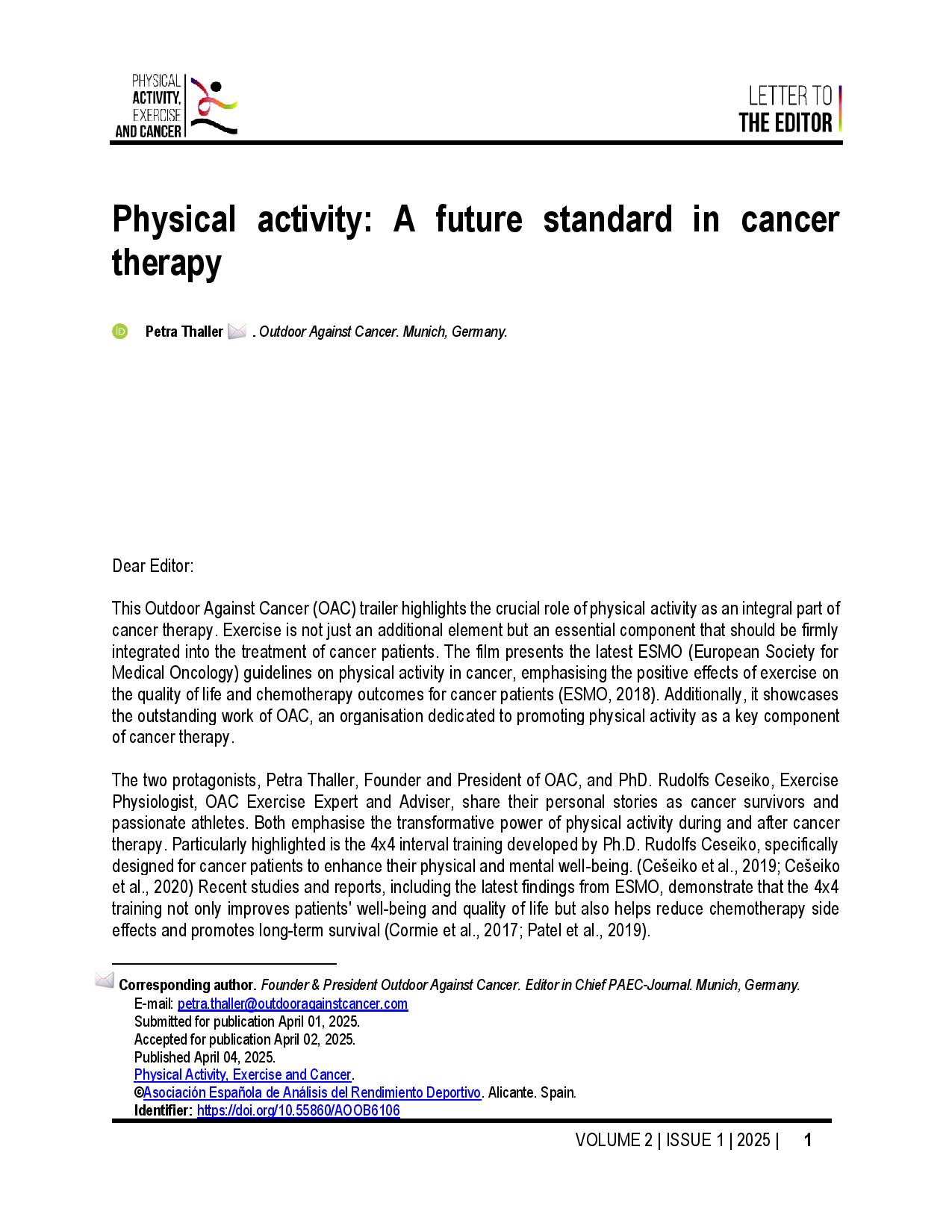Physical activity A future standard in cancer therapy
Main Article Content
Abstract
This letter emphasizes the importance of physical activity as a key component of cancer therapy, in line with ESMO guidelines. It highlights the work of Outdoor Against Cancer (OAC) in promoting exercise for cancer patients. It showcases the 4x4 interval training developed by Ph.D. Rudolfs Ceseiko, designed to enhance physical and mental well-being in cancer patients, and supported by recent studies. Petra Thaller shares her personal experience and the motivation behind founding OAC, which develops tailored exercise programs. The letter concludes that integrating physical activity into cancer therapy is essential and can significantly improve treatment outcomes.
Article Details

This work is licensed under a Creative Commons Attribution-NonCommercial-ShareAlike 4.0 International License.
References
Cešeiko R, Eglītis J, Srebnijs A, Timofejevs M, Purmalis E, Erts R, Vētra A, Tomsone S. (2019). The impact of maximal strength training on quality of life among women with breast cancer undergoing treatment. Exp Oncol. 41(2):166-172. https://doi.org/10.32471/exp-oncology.2312-8852.vol-41-no-2.13249
Ceseiko, R., Brinkmane, A., Eglitis, J., et al. (2020). 4x4 high intensity interval training impact on physical fitness and quality of life in cancer survivors. Journal of Cancer Research and Clinical Oncology, 146(3), 661-669.
Cešeiko R, Thomsen SN, Tomsone S, Eglītis J, Vētra A, Srebnijs A, Timofejevs M, Purmalis E, Wang E. (2020). Heavy Resistance Training in Breast Cancer Patients Undergoing Adjuvant Therapy. Med Sci Sports Exerc. 52(6):1239-1247. https://doi.org/10.1249/MSS.0000000000002260
Cormie, P., Zopf, E. M., Zhang, X., & Schmitz, K. H. (2017). The impact of exercise on cancer mortality, recurrence, and treatment-related adverse effects. Epidemiologic Reviews, 39(1), 71-92. https://doi.org/10.1093/epirev/mxx007
ESMO Guidelines Committee. (2018). Physical exercise improves quality of life and reduces chemotherapy side effects. Annals of Oncology, 29(Supplement 4), iv267-iv269. https://doi.org/10.1093/annonc/mdy180
Eyl, R. E., Xie, K., Koch-Gallenkamp, L., Brenner, H., & Arndt, V. (2020). Quality of life and physical activity among long-term (≥ 5 years post-diagnosis) colorectal cancer survivors-systematic review. Health and Quality of Life Outcomes, 18(1), 1-15.
Friedenreich, C. M., Neilson, H. K., & Farris, M. S. (2016). Physical activity and cancer outcomes: a precision medicine approach. Clinical Cancer Research, 22(19), 4766-4775. https://doi.org/10.1158/1078-0432.CCR-16-0067
Ligibel, J. A., Barry, W. T., Alfano, C., et al. (2016). Impact of a pre-operative exercise intervention on breast cancer proliferation and gene expression: results from the pre-operative health and body (PHAB) study. Clinical Cancer Research, 22(23), 5895-5901.
McTiernan, A., Friedenreich, C. M., Katzmarzyk, P. T., et al. (2019). Physical activity in cancer prevention and survival: a systematic review. Medicine & Science in Sports & Exercise, 51(6), 1252-1261. https://doi.org/10.1249/MSS.0000000000001937
Patel, A. V., Friedenreich, C. M., Moore, S. C., et al. (2019). American College of Sports Medicine Roundtable Report on Physical Activity, Sedentary Behavior, and Cancer Prevention and Control. Medicine & Science in Sports & Exercise, 51(11), 2391-2402. https://doi.org/10.1249/MSS.0000000000002117
Scott, J. M., Nilsen, T. S., Gupta, D., & Jones, L. W. (2018). Exercise therapy and cardiovascular toxicity in cancer. Circulation, 137(11), 1176-1191. https://doi.org/10.1161/CIRCULATIONAHA.117.024671




